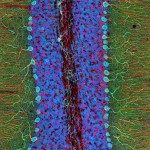Link to Pubmed [PMID] – 15134788
Curr. Opin. Immunol. 2004 Jun;16(3):374-81
B and T cells sense antigens through specific receptors, which, when activated, induce signalling cascades leading to the activation of a series of transcription factor families, such as NF-kappaB. These transcription factors control differentiation, cytokine production and proliferation, and they protect against apoptosis. Much progress has been made during the past two years in the understanding of the molecular events leading to NF-kappaB activation, but, although most of the molecules in this signalling cascade have now been identified, the detailed molecular events remain obscure; in particular regarding the molecules that specifically connect the T-cell receptor (TCR)- and B-cell receptor (BCR)-proximal adaptors and kinases to the central core of the NF-kappaB cascade, the IkappaB kinase complex. As these events are likely to be specific for both extremities of the signalling cascade (the TCR or BCR on one end, and NF-kappaB target genes on the other) they will ultimately represent the best targets to specifically manipulate this response in lymphocytes.

